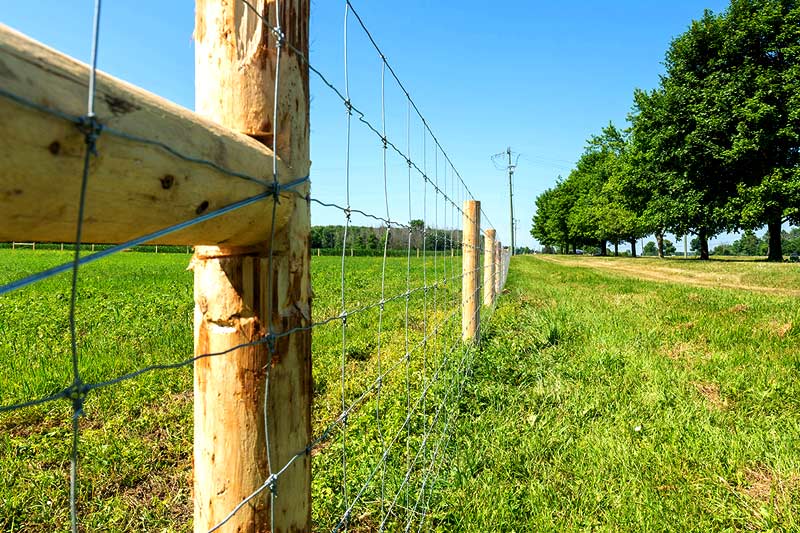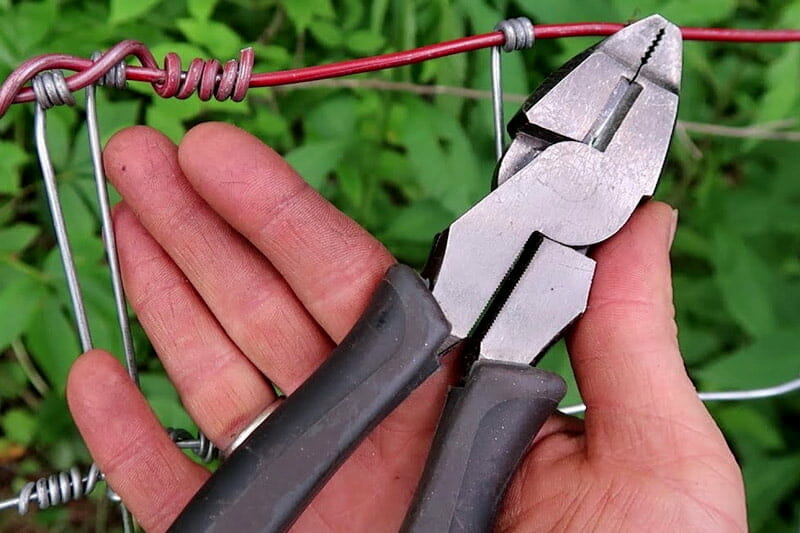Chicken wire, distinguished by its distinctive hexagon pattern, is crafted from intertwined wire. This construction provides significant flexibility, making it ideal for uneven terrain. It adapts smoothly to various inclines, allowing for simple modifications.
The cost of the material for a chicken wire fence ranges from $0.35 to $1 per linear foot. The total expense, including the installation of the fence, could run a ballpark cost of $2 to $4.50 per linear foot.
Chicken wires come in a wide variety of mesh size openings. Not only they are flexible, but they are also very strong and are used in many different ways. They are popular for agricultural purposes, such as keeping poultry and small animals safe.
What we cover
ToggleChicken wire installation and project cost
Usually, poultry fencing is stapled to wood structures that are typically set at 8-foot or 10-foot fences posts. In choosing the height of your chicken wire fence post, the total cost shall also differ since it changes the number of materials to be used.
For reference, below are the average prices on chicken wire fence installation, the cost of materials, the total project cost assuming a 164-linear foot area, and the average cost per linear foot.
| Description | Materials (wire & posts) | Cost of installation | Project cost (164-linear foot area) | Cost per linear foot |
|---|---|---|---|---|
| Chicken wire fencing (8’ posts) | $154 - $260 | $492 - $820 | $646 - $1080 | $4 - $7 |
| Chicken wire fencing (10’ posts) | $217 - $324 | $492 - $829 | $709 - $1144 | $4 - $7 |
| Chicken wire fencing (18’ posts) | $354 - $452 | $492 - $820 | $837 - $1272 | $5 - $8 |
Woven wire fencing cost per foot
Most professionals who install these fences opt to measure the project by foot. Depending on the material you chose for your woven wire, the installation cost is between $1.10 to $2.50 per linear foot.
The different mesh sizes available for woven wires serve different purposes. They are mainly used on farms and ranches. Woven wires also cost more than barbed wires.
2” x 4” mesh
A 2”x4” mesh is ideal for hoofed animals to prevent them from getting their hooves through the holes of the fence. This could cost around $180 with a roll of 100 ft. that is 5 ft. high.
6” x 6” mesh
A 6”x6” mesh, on the other hand, is appropriate for larger animals like goats, sheep, and cows. Using the standard height for this specific size, a roll of 330 ft. with a height of 4 ft. costs around $189.
Woven wire
Woven wire fencing is often preferred by homeowners as they are more attractive than other wires and are much safer for children and pets. For these reasons, they are more costly than barbed wires.
For the total expenses, the cost of materials and the cost of labor will be added.

Woven wire fence labor cost
Many fencing companies these days offer an estimated cost calculator on their websites. You only need to input the specific material, the length, and height, and the size of its mesh to figure out their estimated costs including labor.
Labor costs for installing woven wire fences will either be charged by the hour or by the foot. Whether you prefer the one over the other, the project will not start unless a total price is agreed upon by you and your local fencing company.
Woven wire fence cost per hour
Installing a woven wire fence costs about $40 to $60 per hour. A fencing project is charged by the hour, especially when it is not a large project.
Small projects can be completed in 1-3 days, With this timetable, the labor cost could go from $320 to $1,440.
Woven wire fence cost per foot
Most fence installers charge their labor by foot. Projects like these are usually for larger areas that need woven wire fence installation. This will cost around $1.10 to $2.50 per linear foot.
If your property measures around 1 acre, the labor cost will be estimated at $920 to $2,090.
Other costs in woven wire fencing
Besides the woven wire itself, other materials need to be accounted for when estimating the total cost for the installation.
Posts
The cost of these posts will depend on the material, the thickness, and the height. They could either be wood or metal.
For a more affordable choice, wood posts only cost $20 to $50 individually, but their affordability comes with a disadvantage.
Wood posts are not durable when exposed to the elements so they are going to need replacement from time to time.
Metal posts, however, are more durable and can last longer than wood posts. Moreover, they cost relatively more as they range from $25 to $60 each.
Gates
Depending on the material, length, and level of decoration, gates cost around $150 to $600. For a fenced area, you are going to need at least one gate for access. Larger properties may need more than one gate.
Miscellaneous
There are plenty of other materials that are necessary for constructing a woven wire fence. This includes nails, staples, and concrete. For the average project, nails and staples will cost $20 to $50.
Concrete costs will range from $3 to $6 per bag. This material is needed to secure the posts and provide more holding power.
Factors considered in woven wire fence cost
To determine the total estimated cost for woven wire fencing, here are the biggest factors to consider:
Permits
You will not need a permit to replace an existing fence or add a fence within your property perimeter under 6 feet high.
Some states do require it, however, so best check your local state fencing laws and permits page here. As a reference, Texas’ permitting for fences costs $25 to $50. Most states require permits whenever an upgrade is about to be made to your property.
These permits help ensure that these additions follow building codes, safety rules, and local area rules on appearance and quality.
Make sure that you contact your local zoning office prior to starting a project to avoid getting fined.
Land grading
Installing fences will require you to prepare your area first by making sure the ground is level. Land grading will make the installation process easier and smoother.
Whether removing/filling land areas or removing trees from the area, the goal of this ground preparation is to ensure the fences will stand on a leveled ground for proper installation.
Depending on how much land you are going to have to add, remove, or alter, you can expect to pay $500 to $5,000 for land grading.
Materials
Besides the posts, gates, and other materials, the woven wire is the only material that has the biggest cost.
Length and height
The cost of the woven wire will depend on the length and height you choose. These wires are sold in rolls that go as long as 100 ft to 330 ft per roll.
Options for its height are 4, 6, and 8 ft tall, depending on the use of the fence – whether it is for livestock or residential areas.
Mesh size
Choosing a mesh size for your fence will depend on the purpose of your installation. If you are fencing livestock, it is better to choose a 2”x4” mesh. A 6”x6” mesh for a fence is ideal for residential areas to keep children and pets safe.

Strength
The strength of the woven wire is also a factor in the total costs. The thinnest fences are made from 18-gauge wire while the strongest fences are made from 6-gauge wire.
For containing livestock or pets, the best option would be a 10 to a 6-gauge fence. For private properties or residential areas, an 18 to 12.5-gauge fence would suffice.
Installation
Your local fencing company will either charge you by the hour or by foot. Depending on what kind of fencing project it is, you can expect to pay $40 to $60 per hour or $1.10 to $2.50 per linear foot.












